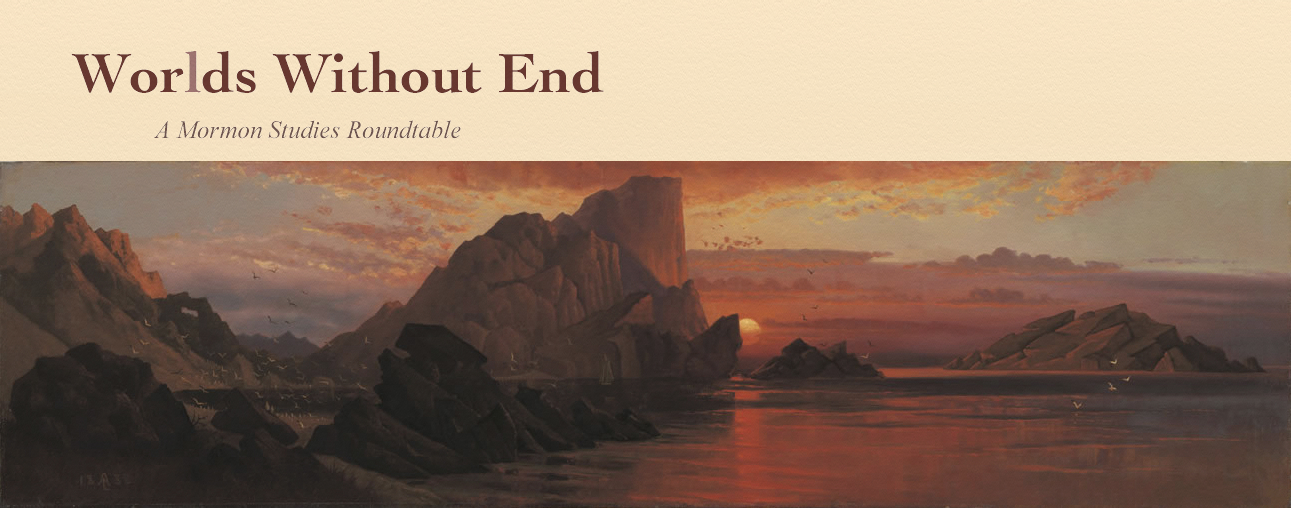In the previous two posts I briefly covered the ancient history of Christian theodicies and introduced readers to modern Philosophers who continue in the Christian tradition to offer possible explanations for the existence of evil. Now I’d like to examine a devotional talk given by philosopher David Paulsen at BYU, I had intended to offer some commentary on Paulsen’s thoughts but the length of this post grew exponentially and I’ve decided to leave my thoughts for a fourth installment. Once again, I invite readers to make comments and offer their own thoughts.
I chose this particular devotion over a more formal paper because I think Paulsen is doing what so many philosophers fail to do, take their ideas and put them to work with the intention of strengthening your fellow human beings. As Gadamer would say, hermeneutics is praxis.
Paulsen begins by making an important distinction that the problem of evil can come in many forms. Just like the cosmological argument, the problem of evil really represents a family of arguments that utilize different strategies or focus on just one particular aspect:
I say the problem of evil, but actually there are many. Today I want to consider with you just three, which I will call (1) the logical problem of evil; (2) the soteriological problem of evil; and (3) the practical problem of evil. The logical problem is the apparent contradiction between the world’s evils and an all-loving, all-powerful Creator. The soteriological problem is the apparent contradiction between certain Christian concepts of salvation and an all-loving Heavenly Father. The practical problem is the challenge of living trustingly and faithfully in the face of what personally seems to be overwhelming evil.
In regards to the logical problem of evil, Paulsen makes use of David Hume and English Philosopher Antony Flew to succinctly state the argument (notice how this is the same problem Augustine tried resolve):
To state Flew’s argument differently: If God creates all things (including finite agents) absolutely (that is, out of nothing), knowing beforehand all the actual future consequences of His creative choices, then He is an accessory before the fact and ultimately responsible for every moral and nonmoral defect in the universe. And if, as some believers allege, some human agents will suffer endlessly in hell, God is also at least jointly responsible for these horrendous outcomes. But if so, how can He possibly be perfectly loving? Given the traditional understanding of God, whatever our consistency-saving strategies, in the end, I believe, we must candidly confess that they are not very convincing.
But Paulsen makes the valid observation that God is not just a list of divine properties and failure to take into account the life and mission of Jesus Christ is a mistake that just produces a caricature of Christianity that is not helpful. Paulsen feels that applying the Mormon conception of Jesus and his mission in addition with the revelations of Joseph Smith helps resolve a few of the arguments mentioned:
I propose, then, to consider the problem of evil from this broader perspective, confronting it in terms of its starkest statement but also in terms of its strongest possible solution: a worldview centered in the saving acts of Jesus Christ.
The Prophet Joseph Smith received revealed insights that do address the problem of evil in its broadest terms. His revelations suggest what might be called a soul-making theodicy, centered within a distinctively Christian soteriology (or doctrine of salvation), but both framed within a theology that rejects both absolute creation and, consequently, the philosophical definition of divine omnipotence which affirms that there are no (or no nonlogical) limits to what God can do. The Prophet’s worldview, I believe, dissolves the logical and soteriological problems of evil while infusing with meaning and hope our personal struggles with suffering, sin, and death. To show (albeit briefly) that this is so is my purpose this morning.
From here, Paulsen moves to introducing John Hick’s soul-making theodicy but finds it lacking. First, because Hick still holds to the doctrine of creation ex nihilo, God still appears to be responsible for evil. Hick’s way out is a kind of universalism where all agents eventually go to heaven to provide a correction to all the evils any agent had suffered. Paulsen does find this option appealing but takes issue with it because it seems to rob creatures of their agency by rigidly determining their future before creation and its weak scriptural support among other things.
This leads Paulsen into offering better alternatives that are to be had in Mormon theology, drawing from the famous King Follett sermon and the Book of Mormon he concludes:
If my interpretation of 2 Nephi 2 is correct, then it seems as if we ought to reject the classical definition of omnipotence in favor of an understanding that fits better with the inspired text. Given that text, how ought we understand divine omnipotence? B. H. Roberts plausibly proposed that God’s omnipotence be understood as the power to bring about any state of affairs consistent with the natures of eternal existences.So understood, we can coherently adopt an “instrumentalist” view of evil wherein pain, suffering, and opposition become means of moral and spiritual development. God is omnipotent, but He cannot prevent evil without preventing greater goods or ends—the value of which more than offsets the dis-value of the evil: soul-making, joy, eternal (or godlike) life.
And finally, Paulsen’s own example from Mormon history:
A case in point: the dark days of 1838 when the Saints were driven from Missouri. The setting was as follows: A vast number of Mormon families had been burned out of their homes by mobs. Fathers were tied to trees and bullwhipped. Thirty-four people, including men and children, had been massacred at a settlement known as Haun’s Mill. Shortly thereafter, the Mormon settlement at Far West, Missouri, was besieged and sacked by the state militia. Soldiers raped some of the women so many times that they died from the torture. Joseph Smith had been betrayed by a friend and turned over to military mobsters to be killed. He was taken to a small dungeon called Liberty Jail. During the four months of imprisonment, Joseph and his companions were abused, fed human flesh, and left in filthy conditions.
Joseph Smith felt abandoned by God. In a prayer Joseph questioned from the depths of his soul:
O God, where art thou? And where is the pavilion that covereth thy hiding place?
How long shall thy hand be stayed, and thine eye, yea thy pure eye, behold from the eternal heavens the wrongs of thy people? [D&C 121:1–2]
In response to this prayer of the soul’s desperation, Joseph heard God:
My son, peace be unto thy soul; thine adversity and thine afflictions shall be but a small moment;
And then, if thou endure it well, God shall exalt thee on high. . . .
. . . Know thou, my son, that all these things shall give thee experience, and shall be for thy good.
The Son of Man hath descended below them all. Art thou greater than he? [D&C 121:7–8; 122:7–8]
Confronted with what seemed to be overwhelming evil, Joseph found meaning in his suffering, maintained hope, trusted God, and kept the faith. And God spoke peace.


I am going to read the Paulsen paper this evening, but right off the bat I’d suggest that Paulsen has a big problem to overcome: The Book of Mormon refers to God as The Lord Omnipotent in a a few places and even claims he has all power, all wisdom and all understanding. Maybe Paulsen is able to reconcile his theory of a limited God with what The Book of Mormon claims, I can’t wait to find out. I suspect, however, that making God subject to a law, and thus, claiming the law is greater than God, won’t fly with most LDS believers.
This has always struck me as one of the most plausible solutions to the problem of evil, though I wasn’t previously aware of Paulsen’s use of it. One of the most powerful statements of this theodicy I’ve ever read was Orson Scott Card’s novel The Worthing Saga. I highly recommend it.
Having said that, I think this view breaks down at several levels, one of which is when you begin looking at specific cases. It’s difficult to see, for instance, how the annihilation of Pompeii by the eruption of Mount Vesuvius helped bring about joy or moral improvement. It’s also difficult to explain why, if evil is really necessary for positive outcomes, the reduction of disease and violence shouldn’t be considered a net loss for the world. We’ve eradicated smallpox. Joy and meaning still exist. Therefore, smallpox was not necessary for joy and meaning to exist.
Normally people try to excuse the problem of evil by two methods: either A) by saying that God gave people free will and therefore can’t be responsible for those person’s evil actions and B) by saying (as Paulsen does above) that the suffering actually improves life. But both of these solutions fail when it comes to disasters like earthquakes. Most earthquakes aren’t caused by humans and they don’t improve life at all. Any lessons that one might learn from suffering through the death and distruction of an earthquake can just as easily be learned other ways. There are millions of people who turn out fine without suffering through a major disaster. So by allowing these disasters to happen, God would be allowing suffering in the world to happen to innocent people for no reason. Saying “oh, they’ll eventually get salvation” doesn’t change the fact that God (under this view of the world) put innocent people in harms way for no reason (and that is ignoring all of the problems that come from the idea that God killing his son (temporarily) is somehow a better way of forgiving people rather than, you know, just forgiving them).
Chris W., I think it depends on how you phrase it.
If you come up with the soundbite “the law is more powerful than God is” – yes, you are going to have objections.
But is that really a fair way to phrase things? A Catholic theologian would likely agree that God cannot create a square triangle.
Does that mean that the definitions of shapes are more powerful than God is? It’s the old “can God create a rock so big he can’t lift it” argument. It’s a silly argument because it has no basis in reality at all.
If we define omnipotence simply as the ability and capacity for doing things that actually CAN BE DONE, then the problem with the word “omnipotence” vanishes.
Hibernia, I wonder if a bit of Mormon mysticism doesn’t add something to the earthquake problem.
The idea that the earth itself is troubled by the wickedness on it.
Of course, this leads to problematic scenes like Reverend Jerry Falwell claiming Hurricane Katrina happened because of the sin in New Orleans. Which everyone was outraged that he would say something judgmental like that.
But hypothetically speaking – what if he was right?
I see that this has already come up, but I am of a similar mindset to Hibernia when it comes to natural disasters. Seth’s proposition isn’t completely convincing to me (although I do like the idea of it in some cases — for example, what is the narrative behind anthropogenic climate change if not that our actions [and our ecological “wickedness”] comes with consequences?)
I mean, bad things happen to good people. The “evil” of natural disaster is not a way to balance injustice — it is a source of injustice.